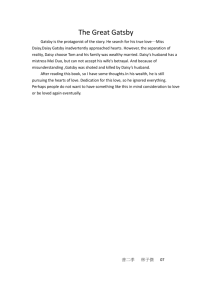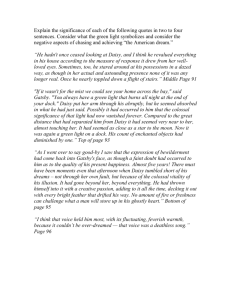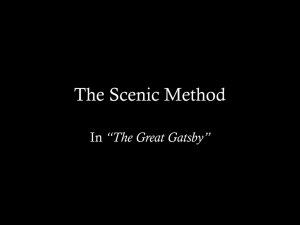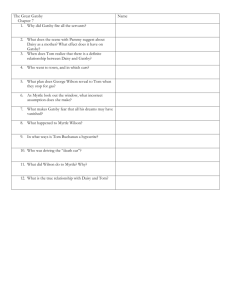“He thinks she goes to see her sister in New York. He's so dumb he
advertisement
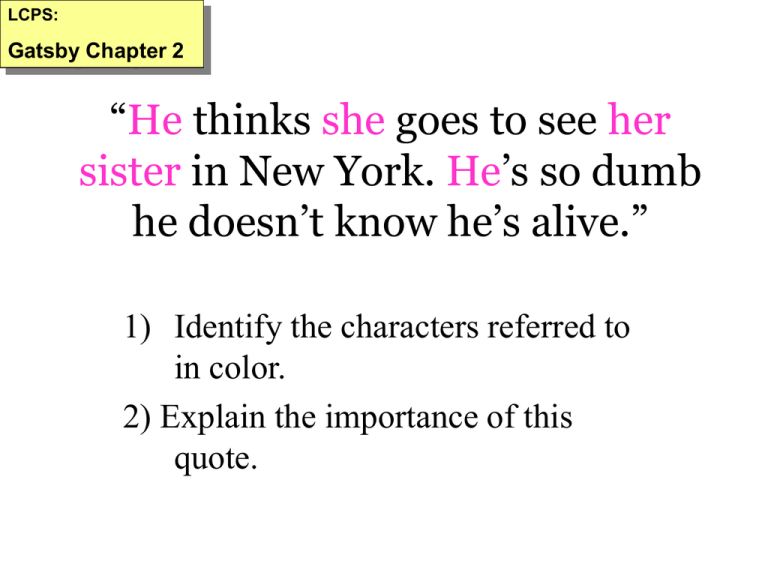
LCPS: Gatsby Chapter 2 “He thinks she goes to see her sister in New York. He’s so dumb he doesn’t know he’s alive.” 1) Identify the characters referred to in color. 2) Explain the importance of this quote. “I told that boy about the ice.” [She] raised her eyebrows in despair at the shiftlessness of the lower orders. “These people! You have to keep after them all the time.” • 1) Who says this? • 2) Explain the tone of what is said. • 3) Why is this an ironic statement given who said it? 1) Identify the speaker. 2) About whom is this being spoken about? 3) What is “breeding?” 4) What’s so wrong about borrowing a suit to get married in? “I married him because I thought he was a gentleman,” she said finally. “I thought he knew something about breeding, but he wasn’t fit to lick my shoe.” ... “The only CRAZY I was was when I married him. I knew right away I made a mistake. He borrowed somebody’s best suit to get married in, and never even told me about it.” Below, write out three rumors associated with Gatsby. • • “Well, they say he’s a nephew or a cousin of Kaiser Wilhelm’s. That’s where all his money comes from.” “Somebody told me they thought he killed a man once.”... “I don’t think it’s so much THAT,” argued Lucille sceptically; “it’s more that he was a German spy during the war.” 1) 2) 3) 4) Fill in the two blanks. Why is Daisy’s name being repeated over and over? Why was such repetition discontinued in such a manner? Is it acceptable to hit women? All women? “Daisy! Daisy! Daisy!” shouted ______. “I’ll say it whenever I want to! Daisy! Dai——” Making a short deft movement, ___ broke her nose with his open hand. Chapter 3 • There was music from my neighbor’s house through the summer nights. In his blue gardens men and girls came and went like moths among the whisperings and the champagne and the stars. • Why moths? Excess? Identify at least 10 examples of excess in this passage. Every Friday five crates of oranges and lemons arrived from a fruiterer in New York—every Monday these same oranges and lemons left his back door in a pyramid of pulpless halves. There was a machine in the kitchen which could extract the juice of two hundred oranges in half an hour if a little button was pressed two hundred times by a butler’s thumb. At least once a fortnight a corps of caterers came down with several hundred feet of canvas and enough colored lights to make a Christmas tree of Gatsby’s enormous garden. On buffet tables, garnished with glistening hors-d’oeuvre, spiced baked hams crowded against salads of harlequin designs and pastry pigs and turkeys bewitched to a dark gold. In the main hall a bar with a real brass rail was set up, and stocked with gins and liquors and with cordials so long forgotten that most of his female guests were too young to know one from another. Hey, what is the significance of these two passages? “I believe that on the first night I went to Gatsby’s house I was one of the few guests who had actually been invited. People were not invited—they went there.” “As soon as I arrived I made an attempt to find my host, but the two or three people of whom I asked his whereabouts stared at me in such an amazed way, and denied so vehemently any knowledge of his movements, that I slunk off in the direction of the cocktail table—” Who is Lucille? Does she know Gatsby? What is the purpose of this passage? “I like to come,” Lucille said. “I never care what I do, so I always have a good time. When I was here last I tore my gown on a chair, and he asked me my name and address—inside of a week I got a package from Croirier’s with a new evening gown in it..... It was gas blue with lavender beads. Two hundred and sixty-five dollars.” What’s the big fuss? Who are we talking about? What is the significance of the quote? At her first big golf tournament there was a row that nearly reached the newspapers—a suggestion that she had moved her ball from a bad lie in the semi-final round. The thing approached the proportions of a scandal— then died away. A caddy retracted his statement, and the only other witness admitted that he might have been mistaken. The incident and the name had remained together in my mind. 1) Speakers A and B? 2) What specifically does this tell us about speakers A and B? “You’re a rotten driver,” I protested. “Either you ought to be more careful, or you oughtn’t to drive at all.” “They’ll keep out of my way,” she insisted. “It takes two to make an accident.” “Suppose you met somebody just as careless as yourself.” “I hope I never will,” she answered. “I hate careless people. That’s why I like you.” “Every one suspects himself of at least one of the cardinal virtues, and this is mine: I am one of the few honest people that I have ever known.” 1) Speaker? 2) Tone? 3) Significance?
